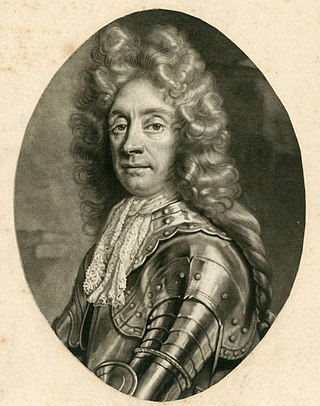Related Research Articles

The Battle of the Boyne took place in 1690 between the forces of the deposed King James II, and those of King William III who, with his wife Queen Mary II, had acceded to the Crowns of England and Scotland in 1689. The battle was fought across the River Boyne close to the town of Drogheda in the Kingdom of Ireland, modern-day Republic of Ireland, and resulted in a victory for William. This turned the tide in James's failed attempt to regain the British crown and ultimately aided in ensuring the continued Protestant ascendancy in Ireland.

Frederick Herman de Schomberg, 1st Duke of Schomberg KG PC was a German-born military officer and peer who served as Master-General of the Ordnance from 1689 to 1690. Having fought in the French, Portuguese and English armies, he was killed in action fighting on the Williamite side at the Battle of the Boyne in 1690.

The Williamite War in Ireland took place from March 1689 to October 1691. Fought by Jacobite supporters of James II and his successor, William III, it resulted in a Williamite victory. It is generally viewed as a related conflict of the 1688 to 1697 Nine Years' War.
The Break of Dromore took place on 14 March 1689 near Dromore, County Down in the early stages of the Williamite War in Ireland. It featured Catholic Jacobite troops under Richard Hamilton and Protestant Williamite militia led by Hugh Montgomery and Arthur Rawdon.
Events from the year 1689 in Ireland.
Alexander Cannon was a Scottish professional soldier in the second half of the 17th century, who served in the armies of William of Orange and James VII and II.

The Irish Army or Irish establishment, in practice called the monarch's "army in Ireland" or "army of Ireland", was the standing army of the Kingdom of Ireland, a client state of England and subsequently of Great Britain. It existed from the early 1660s until merged into the British Army in 1801, and for much of the period was the largest force available to the British monarchy, being substantially larger than the English and Scottish establishments.
Lawrence Dempsey was an Irish soldier of the seventeenth century.

The siege of Carrickfergus took place in August 1689 when a force of Williamite troops under Marshal Schomberg landed and laid siege to the Jacobite garrison of Carrickfergus in Ireland. After a week the Jacobites surrendered, and were allowed to march out with the honours of war.
Robert Ramsay was a Scottish Jacobite soldier noted for his service during the Williamite War in Ireland. A Roman Catholic and veteran of the "French Brigade" which served in the Third Anglo-Dutch War under the Duke of Monmouth, Ramsay held the post of Adjutant-General of Foot in the English Army prior to the deposition of James II in the 1688 Glorious Revolution.
John Cunningham was an Anglo-Irish soldier known for his command of an aborted attempt to relieve the city of Derry during the 1689 Siege. His failure led to his dismissal and replacement by William Stewart. Some sources refer to him as Thomas Cunningham, but the vast majority called him John.
Sir Charles Carney was an Irish professional soldier, who later in his career became a Jacobite. He served as an officer in the Irish Army of James II during the Williamite War in Ireland.
The raid on Newry took place in November 1689 during the Williamite War in Ireland when a Franco-Irish force loyal to James II attacked the Williamite garrison of Newry in County Down. The raid was carried out by the French Major General Alexandre de Rainier de Droue, Marquis de Boisseleau a French officer serving with James' Irish Army. It was largely unsuccessful and the Jacobite forces withdrew having suffered casualties.
Sir William Franklin was an Irish politician and soldier of the seventeenth century.

Philip Babington (1632–1690) was an English military officer, who served in the armies of the Commonwealth of England, the Dutch Republic and England. He accompanied William III to England in the 1688 Glorious Revolution and was Member of Parliament and Governor for Berwick-upon-Tweed from 1689 to 1690.
Dundalk Camp was a military camp which served as the headquarters of the Williamite Army under Marshal Schomberg in Autumn 1689 as part of the Williamite War in Ireland. The camp rapidly became notorious for the great loss of life suffered by soldiers due to the exposed conditions, shortage of supplies and inadequate medical facilities.

William Dorrington was an English army officer. Contemporary sources often spell his surname as "Dorington", or "Dodington".
Dominic Sheldon, often written as Dominick Sheldon, was an English soldier. A leading Jacobite he served in James II's Irish Army during the Williamite War between 1689 and 1691. He was a noted cavalry commander, present at the Battle of the Boyne and Battle of Aughrim. Later after going into exile, he rose to the rank of lieutenant general in the French Army. He was also remained a prominent courtier at the Jacobite court in exile at Saint Germain.
Richard Brewer was an English army officer of the seventeenth century. In 1688, Brewer took part in the Army Plot against James II during the Glorious Revolution.

Thomas Maxwell was a Scottish professional soldier.